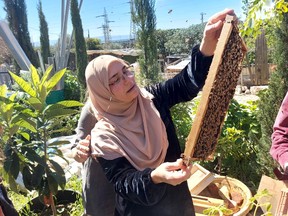On October 8, the Hezbollah terror group that has taken over southern Lebanon, attacked Israel in solidarity with Hamas
Article content
TEL AVIV-JAFFA — “When they told me to leave, I just grabbed my Havaianas (flip flops), jeans and a T-shirt,” said Niv Nasifi, an evacuee from Israel’s most northerly town, Kiryat Shmona.
She, her parents and their beagle, Kai, were told by the Israeli government to evacuate five months ago. Rockets and guided missiles put them in harm’s way.
Article content
Hamas rockets don’t reach Kiryat Shmona, a working-class town, about 240 kilometres north of the Gaza enclave in the finger of the Galilee. But on Oct. 8, the Hezbollah terror group that has taken over southern Lebanon, attacked Israel in solidarity with Hamas. “Our rockets are with you,” a senior Hezbollah member announced to Hamas.
Advertisement 2
Article content
“It’s 1-2-3-4, boom,” said Avi Vanunu, a taxi driver from Kiryat Shmona who is now living at Joseph, a 19-room boutique hotel in Jaffa in southern Tel Aviv, along with several of his local neighbours. “The rocket hits before the siren sounds.”
The room and board are comfortable, but it feels like “we are in a fish tank,” he said. “They threw me from my house, and that’s the reason the Hezbollah has won.”
An estimated 260,000 people were displaced in Israel after the war began. More than half have returned home, but there were still 94,631 Israeli evacuees as of Feb. 29, according to Israel’s National Digital Agency. About half are from Israel’s north, and the rest are from communities around Gaza. Of the Galileans from the north, 21,500 are in hotels throughout the country. The rest have taken a $6,800 monthly stipend for a family of four.
Rinat Shimoni, a Grade 3 teacher from Kiryat Shmona, now teaches her displaced pupils in a movie theatre. “There is no place for a break or for 500 of them to play. It’s hard to take studies seriously this way,” she said. “They let us watch a free movie, though, once.”
Article content
Advertisement 3
Article content
Relief organizations like IsraAID set up schoolchildren on university campuses. They even found space at Yad Vashem, the national Holocaust memorial centre, “but they had to remove the Holocaust symbols” from certain spaces, said Deborah Dahan, who runs the Joseph hotel with her husband, Tsvi.
Recommended from Editorial
The Jaffa couple play dorm mother and father to evacuees, helping with basic needs and bigger ones, such as taking them to the hospital or sitting shiva with those in mourning.
Nasifi’s grandmother, an evacuee, died at a hotel in Jerusalem two months ago. The family was officially banned from burying her in Kiryat Shmona. With two men from the burial society, about 70 family members returned home anyway, risking heat-seeking anti-tank missiles just across the Lebanese border, less than two kilometres to the north. “My brother broke down the gates so we could get in,” says Liza Amir, Nasifi’s mother.
Some evacuees have gone to large hotels. The stress on families is palpable. There are signs of child abuse, dramatic break-ups and suicide attempts, said Nasafi, who is currently doing an internship for a social work degree.
Advertisement 4
Article content
Then there is Galina Katz, a retiree from Kiryat Shmona who is making the most of the parks and culture that Tel Aviv offers.
“It was my dream to vacation here,” Katz said. Despite a rocket hitting her husband’s family home that day, “we aren’t suffering,” she said. “But I don’t see my five grandkids.”
Nasafi acknowledges that Tel Aviv has its perks, although she would rather be back home. She said a local told her: “Yeah, it’s a dream for you, but you’re not the one paying rent or taxes here.”
Tel Aviv-Jaffa is one of the world’s most expensive cities. Old Jaffa, especially, is intriguing for tourists. It’s the picturesque port town where Jonah, in the biblical story, fled on a ship before tangling with a giant fish. With its historic narrow laneways and ancient buildings overlooking the sea, it’s the most-visited tourist area in Israel after Jerusalem, says Tsvi Dahan, the Joseph hotel’s owner.
He said the hotel was fully booked until “something worse than COVID happened,” when Hamas invaded Israel. His cousin was shot in the mouth and killed by terrorists near Gaza.
After the war devastated the travel business, Israel’s tourism ministry provided subsidies for hoteliers. Dahan said he’s doing more now than just providing beds: “We are helping the displaced emotionally, because they feel like refugees in their own country.”
Advertisement 5
Article content

There are evacuees from Muslim villages in the Galilee, too. Yasmine Mesal, from Arab al-Aramshe, a village of 1,800, was evacuated to Nazareth. “Most of my community has returned, because they have farm animals to take care of,” she said. Mesal is not returning, but she has asked her neighbours to check in on her 50,000 animals — her bees.
“I miss cooking for my two daughters and husband, and taking care of my home,” she said. “I miss my bees.”
The bees are part of the Bees for Peace movement, which promotes bringing together Jews and Arabs to practise natural “biodynamic” beekeeping methods. Yossi Aud, who founded the group, travelled to the north recently to check on the hives, but the army wouldn’t let him.
“We are trying to work with the bees to survive this war,” said Aud. “We can’t feed them or give them their special medicine. It’s sad because we lost about 30 to 40 hives.”
“The bees, too, I think are a kind of refugee.”
National Post
Article content









